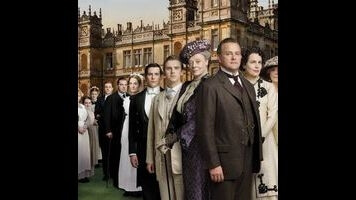I mean “fun” in both the good and bad senses of the word: It’s poking fun at them as much as it’s letting them mess around in the muck with pigs. It’s deflating our ideas about these characters and running them through new challenges that they have to cope with. That makes for an excellent story engine, which is much of the reason why this season has been so successful. This season of Downton is far more willing to take risks than it has been for the past two seasons—and though the results at times veer towards melodrama, the show is much better for it.
But also? Downton Abbey rarely pauses and says to itself, “Oh, this is just a silly story about an unwanted pregnancy!” or “No one really cares about Daisy's romantic status!” As pretentious as its characters can be, Downton Abbey, especially this season, is remarkably willing to stick with the stories of the underserved and overlooked. What starts out as the blueprint of a ploy to stir up some drama or to create a funny scene ends up, more often than not, as something lived among the characters. Part of the benefit of those production values is skilled actors who can play the aftereffects of change—and the time to really work through the longer-term implications of these stories.
It also bears recognizing that many of these stories are women’s stories. In fact, the overarching narratives this season almost exclusively center around conflicts or problems that women are struggling with—and often, they’re conflicts that a man in this society would never have to encounter. Anna’s brutal rape is the best example—though undoubtedly men have also been raped since the beginning of time, her struggle to walk the narrow line between propriety, personal safety, and her duty to her husband strikes me as a particularly female concern. Edith’s accidental pregnancy is, of course, another one. Mary's recovery from widowhood is not strictly feminine, but the show has already dealt with how her family’s legacy dodged her entirely because of her gender. And the focus of the downstairs romance is not on Alfred’s adventures, but on Daisy’s broken heart, which is where the show is truly invested. There’s a reason that we think soap operas are for women—feminine drama is usually considered less prestigious than male drama, as a glance at the list of Emmy-winning television series will tell you. But, if it is soap-operatic to get into the mundane but difficult details of the female experience, then girl, bring on the soap operas.
This week is another where little actually happens, but the individual scenes, as they play out, are extremely important. Chief among them is the pig situation—it’s a little too heavy on the fan service, for me, but it is quite funny, and it’s always good for Mary to challenge herself. (Her hoity-toity little “You go home. They’re my pigs!” was lovely, as was every look on her face when she was carrying a bucket.) I was really resisting the Blake/Mary hate-flirting, but wow, the show is laying it on thick. Fortunately, it’s not a foregone conclusion—right after Blake and Mary make cow-eyes at each other, Tom Gillingham shows up again to try to woo Mary again. And as he’s already declared his intentions, and Evelyn Napier uses the opportunity of a long walk to inform Mary that he’s still interested in her (nine years later!)—well, this is shaping up to be a lovely and awkward dinner party. Which is where Downton Abbey really does best.
Edith is not the character I care most for, but this is a really strong episode for her, as she hovers between two rather difficult choices and begins to rope others into her confidence. Edith is the only one of the three original Crawley sisters who would have brought authority figures into her life in this way—Mary, as we’ve seen, keeps everything a secret, even from herself, and Sybil had too much nerve to hesitate over anything (Edith says about as much in this episode). It’s very interesting to see Lady Rosamund react to this extremely difficult news, and it says a lot about the character that she immediately decides to stand up for Edith and support her. In that way, she is like her mother, the Dowager Countess, who always puts family before propriety. (Robert must take after their father.)
Speaking of Violet—she takes ill in this episode, and it’s pretty upsetting—what would this show be without Maggie Smith?!—but also, in true Grandmama fashion, pretty hilarious, too. (She complains about her nurse, Isobel, incessantly.) I don’t know if this is a foreshadowing of more to come, but I’m worried, either way.
And lastly, as goes without saying these days, Joanne Frogatt’s performance when Mr. Green arrived again was heartbreaking, as was Mrs. Hughes’ condemnation of him in the boot room. But now, Bates has guessed the truth. So this really will be one hell of a dinner party.
Stray observations:
- Okay, shag-marry-shove, with Blake, Gillingham, and Evelyn Napier. Go. (I have an answer, but I’ll put it in the comments. There are limits, people.)
- This week in upper-class privilege: Mary doesn’t know Ivy’s name when Ivy comes across them in the kitchen. Which is about right, of course, but still terribly awkward.
- Carson and Mrs. Hughes conspiring is really cute. (“You’re quite a plotter when you want to be, aren’t you?” “It’s a skill all women must learn.”) Help, this is a weird feeling.
- “I’ve been married. I know everything.”
- This week in “America, what is it?”: Robert and Thomas are going to America! On a boat! Lord Grantham is going to a Senate committee hearing. What is a Senate??!?!
- The Patmore corner of disdain: “I don’t think we need to worry about impressing the French just yet.”


 Keep scrolling for more great stories.
Keep scrolling for more great stories.